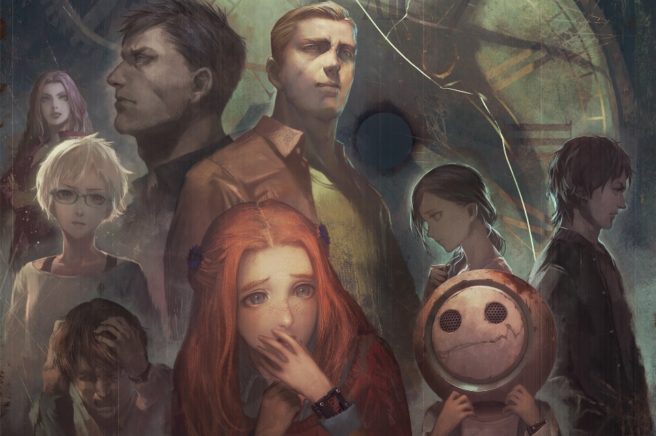Zero Escape creator on origins and making Zero Time Dilemma, series as a whole, more
The shocking ending that calls for a debate
– The devs put an estimated average clear time of 25 hours into Zero Time Dilemma, a bit shorter than Virtue’s Last Reward but longer than 999.
– The interviewer was shocked by how Junpei changed so much from his heroic look in 999 to sulking in Zero Time Dilemma
– Uchikoshi said it was difficult to compose a gathering of past series heroes and heroines in the new game. Especially since there’s four of them, it became hectic to set their personalities. If everyone is the same man of justice, there would be no balance. So they had no choice but to change Junpei’s personality.
– They added a new character Carlos who has a strong sense of justice. So to change Junpei, they added a plot point that he started to sulk after spending a whole year searching for Akane.
– To those who never knew about series before, they may accept Junpei with that personality. But for those who have especially played 999, it would be shocking. Responding to that, Uchikoshi said that after all, Zero Time Dilemma was given the green light only after receiving requests from fans, so they included many features that put consideration from the fans. Of course they also aimed to satisfy series newcomers though.
– Although newcomers can enjoy the system and story themes which are established well, series veterans like the interviewer recommend playing the previous games first.
– However, Uchikoshi has a different viewpoint. Since Zero Time Dilemma has fragmented episodes, perhaps fragmenting the whole series itself would be interesting too. He’d be interested to see someone plays Zero Time Dilemma first and then follows up with 999 or Virtue’s Last Reward after that.
– The ending caused much controversy and debate, but Uchikoshi thinks it should live up to expectations. The interviewer estimates that about 60 percent of the fan base will feel good about the ending. But he also said that even the past games also had some controversies in their endings, so he wondered if Uchikoshi deliberately making them to cause controversial debates, to which Uchikoshi admits it. He included presentation of problems for the users, and would like to let them think for themselves after playing.
– With this, Uchikoshi admits a hypocrisy where while he said he doesn’t want to get criticized, he ended up picking a path where he would definitely get criticized all by his own volition.
The charm of adventure games, and the source of Uchikoshi’s ideas
– Uchikoshi started this segment by asking the Famitsu interviewer Hayashi whether there were any hard parts in ‘making decisions as editor-in-chief’, just like how Zero Time Dilemma has many decisions.
– Hayashi answered that since Famitsu releases weekly, it has 50 issues per year on average, so he has to think about the ‘selling factor’ 50 times. There were many projects raised by editor staff, and he has to decide on which project to cover for the next issue.
– When Uchikoshi asked whether he bases those decisions on instinct or from data and experience, Hayashi replied that it depends on whether there is information on new and major titles or not. When there are neither, they have to include special coverage that will lead to a lot of sales
– Uchikoshi concluded that as being similar to corporate management. In Uchikoshi’s company Spike Chunsoft, while they have major titles like Danganronpa, he was tasked to make a non-major game like Zero Time Dilemma.
– Hayashi notes that the actual experience of making decisions can be felt in adventure games. You can’t restart things in the real world, but you can in games.
– That’s where Uchikoshi made a point in Zero Time Dilemma. By restarting, there will be effects on other fragments, and even can generate new fragments. He wants users to notice that some fragments are connected to each other.
– With Zero Time Dilemma’s development over, Uchikoshi wishes he could recharge (take a rest), but he might be not allowed to do so. When the interviewer asked whether he may be afraid of running out of ideas, he admits so. If he had enough free time, he could search for new material. But if he has to focus on development, he has no time to search for this, and also the stocked materials are going to run out soon.
– When Uchikoshi joins a title project as a director, it could take a long time of over two years. In the meantime, he could join as a scenario writer instead.
– Uchikoshi’s unique ideas came from checking interesting things on the Internet every day. When there are things he is specifically interested in, he also checks out the related documents. From there he can find more connections and dig even further. He reads more books like beginner books on science more than fiction.
– When he finds interesting material, he sometimes wants to tweet about it on Twitter, but if he did so, he wouldn’t be able to use the then-meaningless spoiled material in the game, so he has to restrain himself and use those materials as fertilizer for making the game.
– Uchikoshi doesn’t have any plans to make a non-adventure game in the future by himself, but he has received invitations to make such games together. It all depends on timing and on whether he’s interested in the theme or not, but as a conclusion he’s definitely not going to limit himself to only creating adventure games for his lifetime.
Thanks for making it to the end of this post! If you use any of this translation, please be sure to properly source Nintendo Everything. Do not copy its full contents.
